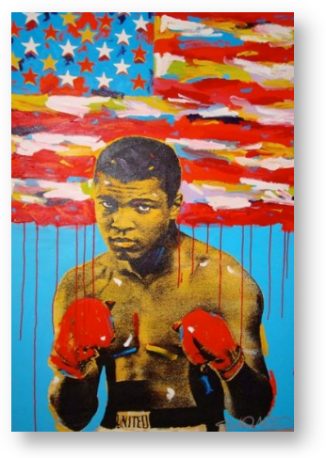June 6, 2016
Written by C.N.
In Memory of Muhammad Ali
This past Friday, June 3 2016, Muhammad Ali passed away at the age of 74. More than being regarded as the greatest boxers ever, Muhammad Ali is remembered as one of the most significant, famous, and celebrated athletes of all time. His legacy transcends his accomplishments inside the boxing ring and also encompasses his tradition of political activism, outspoken support of disadvantaged and underrepresented groups, and his inspiring life history as a role model, social critic, and social conscience of U.S. society.

As with almost all public figures, Muhammad Ali was also a controversial and polarizing figure in U.S. history. Perhaps the most controversial episode for which he was known was his resistance to being drafted to fight in the Viet Nam War. His immense impact on the Asian American community is perhaps best represented by his famous quote at the time, “I ain’t got no quarrel with the Viet Cong. No Viet Cong ever called me nigger.”
After refusing to be inducted into the U.S. military on April 28, 1967, he was convicted of a felony and all of the major boxing associations stripped him of his title and prevented him from competing professionally for over three years. During this period, he was widely denounced and vilified by much of the U.S. as a traitor to the country, with the hostility magnified even more because he was a Black man.
However, in 1971, the U.S. Supreme Court overturned his felony conviction. Despite the public criticism of his refusal to be drafted, Muhammad Ali never wavered in his refusal to participate in the Viet Nam War and continued to work in support of the Civil Rights Movement and efforts toward social justice around the world. He stood his moral ground and in his own words, “He who is not courageous enough to take risks will accomplish nothing in life.”
Time eventually heals all wounds and in recent decades, Muhammad Ali rightfully became known as of the most towering and revered Americans of the late twentieth century. In addition to the multitude of statements and tweets commemorating his life from athletes, public figures, and others around the world, I would like to share some excerpts from a fellow sociologist, the well-renowned Professor Harry Edwards of U.C. Berkeley (edited for length):
It is only when a GIANT passes from among us and we stand blinking and rubbing our eyes in the glaring reality of our loss that we come truly to appreciate how much we all have really been just living in his shadow. So it is with Muhammad Ali: he was an athlete of unparalleled brilliance, beauty, and bravado at a time when black athletes . . . were expected to be silent, self-effacing “producers,” not loquacious, verbose entertaining performers in the arena. . . .
He influenced people from the most powerful (Dr. Martin Luther King, Jr. and Robert Kennedy, for example) to the most naive students and “draft vulnerable” youths to rethink their positions on the issue of “war and peace.”
He was the model for a generation of “activist athletes” relative to the questions of athlete political relevance and involvement. He taught us all by word and example that there can be no “for sale” sign, no “price tag” on principles, human dignity, and freedom, among so many of his other contributions. . . . “The Greatest” doesn’t begin to truly capture the magnitude and measure of his broad scope, contributions and legacy.
Along with millions of Americans and billions of people around the world, I will remember Muhammad Ali as a truly inspiring, transformative, and monumental person who was a tremendously courageous trailblazer for professional athletes, African Americans, Asian Americans, and the entire human race. Rest in peace, champ.
Author Citation
Copyright © 2001- by C.N. Le. Some rights reserved. 
Suggested reference: Le, C.N. . "In Memory of Muhammad Ali" Asian-Nation: The Landscape of Asian America. <https://www.asian-nation.org/headlines/2016/06/in-memory-of-muhammad-ali/> ().
Short URL: https://www.asian-nation.org/headlines/?p=1971
Tags:
Translate Into Another Language![]()
